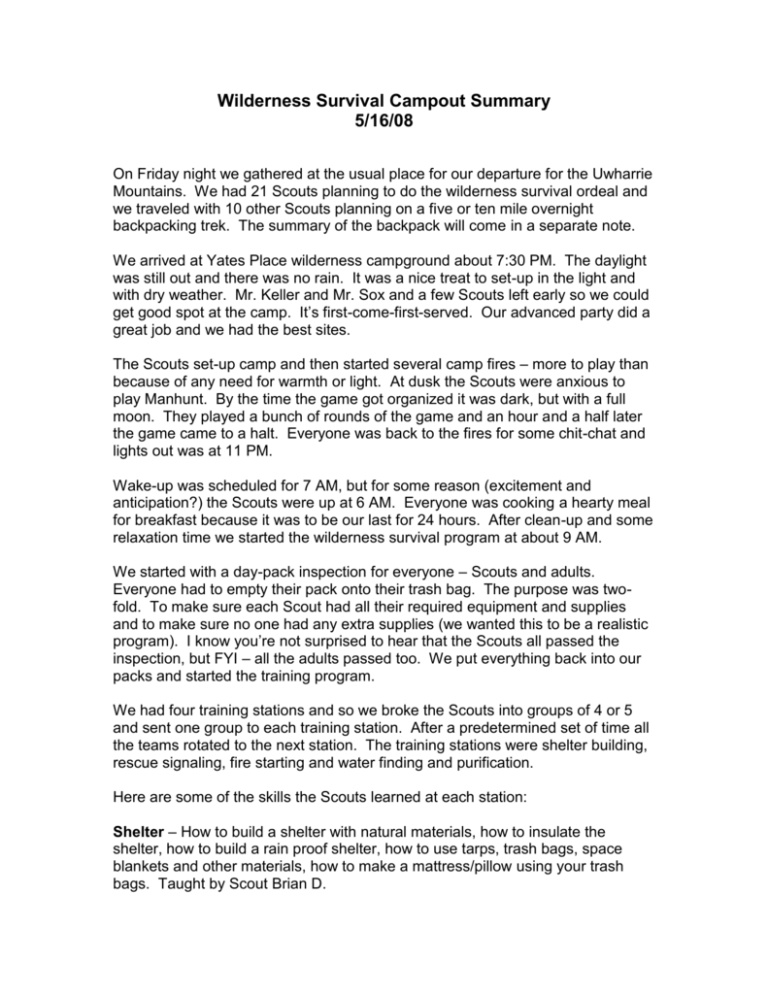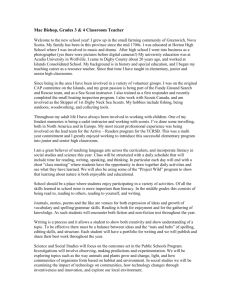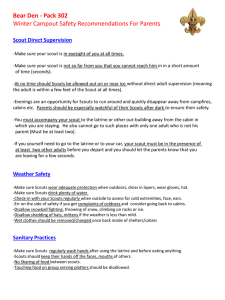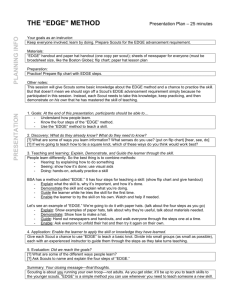Wilderness Survival Campout Summary
advertisement

Wilderness Survival Campout Summary 5/16/08 On Friday night we gathered at the usual place for our departure for the Uwharrie Mountains. We had 21 Scouts planning to do the wilderness survival ordeal and we traveled with 10 other Scouts planning on a five or ten mile overnight backpacking trek. The summary of the backpack will come in a separate note. We arrived at Yates Place wilderness campground about 7:30 PM. The daylight was still out and there was no rain. It was a nice treat to set-up in the light and with dry weather. Mr. Keller and Mr. Sox and a few Scouts left early so we could get good spot at the camp. It’s first-come-first-served. Our advanced party did a great job and we had the best sites. The Scouts set-up camp and then started several camp fires – more to play than because of any need for warmth or light. At dusk the Scouts were anxious to play Manhunt. By the time the game got organized it was dark, but with a full moon. They played a bunch of rounds of the game and an hour and a half later the game came to a halt. Everyone was back to the fires for some chit-chat and lights out was at 11 PM. Wake-up was scheduled for 7 AM, but for some reason (excitement and anticipation?) the Scouts were up at 6 AM. Everyone was cooking a hearty meal for breakfast because it was to be our last for 24 hours. After clean-up and some relaxation time we started the wilderness survival program at about 9 AM. We started with a day-pack inspection for everyone – Scouts and adults. Everyone had to empty their pack onto their trash bag. The purpose was twofold. To make sure each Scout had all their required equipment and supplies and to make sure no one had any extra supplies (we wanted this to be a realistic program). I know you’re not surprised to hear that the Scouts all passed the inspection, but FYI – all the adults passed too. We put everything back into our packs and started the training program. We had four training stations and so we broke the Scouts into groups of 4 or 5 and sent one group to each training station. After a predetermined set of time all the teams rotated to the next station. The training stations were shelter building, rescue signaling, fire starting and water finding and purification. Here are some of the skills the Scouts learned at each station: Shelter – How to build a shelter with natural materials, how to insulate the shelter, how to build a rain proof shelter, how to use tarps, trash bags, space blankets and other materials, how to make a mattress/pillow using your trash bags. Taught by Scout Brian D. Signaling – International ground to air signals (ground markings, fires, smoke, etc), using a signal mirror, two-way radio commands, using materials from nature and from your pack to make signals. This session also covered attitude, and hydration needs and tactics. Taught by Scout Alex B. Fire – The Scouts started fires with just a spark stick or magnifying glass and yes by using only one match. A couple of the adults were doing this for the first time and yes they succeeded too. Taught by Scout Jack K. Water – This session was about water purification. The Scouts all purified a container of water and tasted the “purified” water. We had plans to also teach them how to use a modern water purification filter pump, but our pump malfunctioned and we were not able to use it. Taught by Scout Sean Lang In all these training session, I hope it’s obvious that the Scout didn’t just attend a class – they had to do or perform everything. This way we are sure they all know how to do it for real. We finished the training sessions about 1 PM and the Scouts got an hour off to just play ball or Frisbee or take a break. At 2 PM we all (Scouts and adults) headed for the “wilderness” area (the forest just outside of our camp). The Scouts were allowed to pick their own spot to build their shelter and that caused us to have the Scouts and adults scattered over an area the size of two football fields. Each person had to build their shelter by themselves. And, all but one Scout was able to pull it off. The shelters were all very well made, but we did have one come down in the middle of the night. We finished building the shelters by 4 PM and the Scouts were free to play or talk or nap. Mostly the Scouts were in conversations and just “hanging-out.” We put a work detail together to gather wood so we could keep a fire going all night. That took a couple of hours. About 8:30 PM we started a campfire in the wilderness area and Jack K. the senior patrol leader made some congratulatory comments to the Scouts on their hard work and excellent performance through the day. The first speaker was Mr. Lang who told a true story about how he was once lost in the wilderness alone, at the age of 12 years, after being separated from his dad on a hunting trip. It turns out that Mr. Lang’s dad was a believer in being prepared and so, Mr. Lang did all the right things. Walked down off the mountain to the thicket, started a fire and built shelter. This was in New Hampshire and on a snowy day. Mr Lang knew help would come and he settled in for the night. A long, but good, story short, Mr. Lang’s dad found him that evening and they walked out for the trip home to a warm and dry house. Then Mr. D. told a true wilderness survival story that took place on one of the Channel Islands just three miles off the California coast. The story was very appropriate because it incorporated all the survival gear the Scouts had prepared and techniques they had learned on this trip. The senior Scouts (the instructors) kept a fire going all night and took two hour shifts on fire watch (and roving patrol over the Scouts). We had three or four Scouts who took to the fire for the night or a portion of the night. Ranger Rick and I were camped near the fire and we kept an ear out to see if we were needed, but there were no issues. None of the Scouts showed or talked about their apprehension about the night, but I saw the eyes of a couple of the Scouts and knew they were “wondering what they were doing here.” That said I’m proud to say they all did great and made it fun. By the way, we had a couple of adults who were doing this for the first time and they made it though the night safely too. Wake-up was scheduled for 7 AM again, and yes they were up at 6 AM again and chomping at the bit to go back to camp and make breakfast. The last Scout was up at 6:30 AM and we let them go back to camp and feel civilized again. Since the backpackers were not expected back until about 10 AM we had a leisurely time of packing up camp. That was a blessing because we used a lot of land for the weekend and it took forever to police up the trash and leave it better than we found it (BSA “leave no trace”). The backpackers arrived about 10:15 AM and we were on the road by 10:45 AM. Everyone made it back save and sound. Everyone had an experience they won’t forget for a long time. Gosh! I love Scouting. Bob De Contreras Scoutmaster Troop 216




